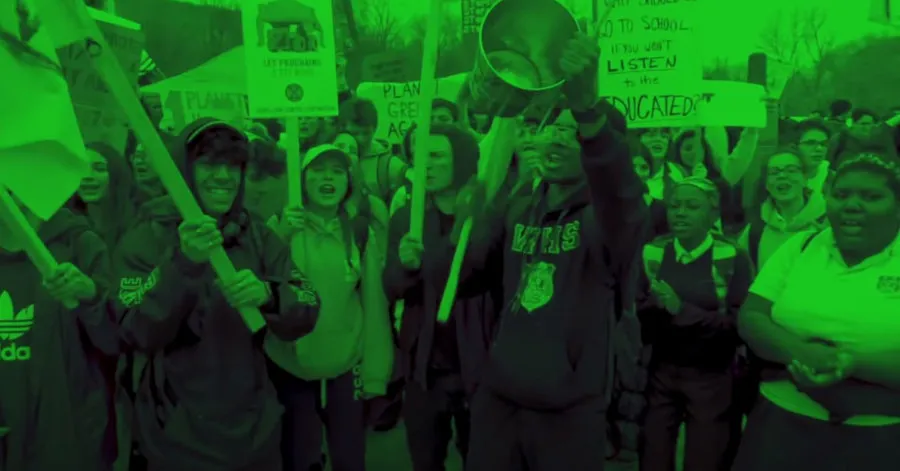After the ending of the Cold War with the fall of the Berlin Wall in 1989 capitalism has successfully presented itself as the only realistic political-economic system. This has resulted in the current situation where this capitalist realism pervades all our thoughts and actions to the point that it's almost impossible for us to even imagine an alternative way to organize society.

source: YouTube
But capitalism doesn't conform to reality or human nature; capitalism colors all areas of contemporary experience, but its effects on the real world lay bare its internal conflicts, resulting in growing stress, depression and unhappiness among the 99 percent. Capitalism's major internal contradiction is the divide between the owners of the means of production, the capitalists, and the real producers of wealth, the workers. Liberals and other fans of capitalism like to point out that this arrangement is mutually beneficial; workers voluntarily agree to work for a boss, and they both get paid. The obvious problem with this is that only one of those two does the work; two people get paid for the work done by only one of them. But the boss provides the workplace, the machines, the computers, you say. Well, those machines, computers and workplaces are also the result of labor done by workers.
What makes this even more evil is that workers make the products that will make them redundant. I work at a service-desk for a large Internet Service Provider, and right now my work is being used to develop an intricate system consisting of automated voice-response, machine-learning, artificial intelligence and scripting that will ultimately make my job unnecessary. My conversations are recorded, analyzed and used as input for the automated responses that will one day make me or others like me lose their jobs. This in itself is not a bad thing; we all have better things to do than slave all day at a job. The problem is capitalism. The owners of the means of production are constantly seeking ways to increase production and cut costs.
This has resulted in a crisis of overproduction. We produce more stuff, but we don't get paid more, which results in the contradictory situation that there aren't enough people with enough money to actually buy all this extra stuff. What would have been normal in this situation is to pay workers more, but that didn't happen and will not happen under capitalism. Instead the capitalists just gave us credit to soften the effects of overproduction. "Don't increase their wages, just give them a credit-card and make it easy to get a loan for their white picket fence house." We all know where this ended; the financial crisis of 2008. And it will happen again because we haven't learned anything from that world wide financial meltdown...
We now have the stupid reality that we produce enough food to feed the world's population twice over and we have ten empty houses for every homeless persons, but capitalism refuses to house the homeless or feed the hungry. On the other hand we think it's perfectly normal that those who don't do the work get almost all of the increased wealth. Or do we? Another symptom of this crazy socioeconomic arrangement is increased mental illness; we're human beings and we know on a subconscious level that something's wrong, something's very wrong with the world we've created. We're increasingly unhappy and depressed, but capitalist realism doesn't allow for a real solution. Instead mental illness is analyzed on individual and materialist grounds exclusively. Mental illness is purely material; it's an imbalance of chemicals in the brain of an individual. As such it can be treated with chemicals, pills and other medicines, which in turn presents capitalists with yet another opportunity to sell products, drugs; the global antidepressants market has exploded, as have suicide numbers, mainly among young people.
If it is true, for instance, that depression is constituted by low serotonin levels, what still needs to be explained is why particular individuals have low levels of serotonin. This requires a social and political explanation; and the task of repoliticizing mental illness is an urgent one if the left wants to challenge capitalist realism. - Mark Fisher
Another area where we're increasingly confronted with capitalism's internal contradictions is in the global warming crisis and other environmental crises. There are no solutions for these existential problems withing the capitalist framework; we will always run up against the contradiction between an economy that implodes without eternal growth on one hand, and a planet with limited resources and a limited capacity to regenerate on the other. It's about time we let go of the notion that capitalism is "just the way things are". It's not. In fact it's the opposite. Capitalism doesn't map to the reality of our daily individual and collective lifes. Just like a map is not the real terrain, the constructed web of rules, laws and language of the capitalist system is not the real thing. We're in a crisis, that much we all know; now it's "just" a matter of recognizing that capitalism itself is the cause of that crisis.
Mark Fisher: Capitalist Realism
Thanks so much for visiting my blog and reading my posts dear reader, I appreciate that a lot :-) If you like my content, please consider leaving a comment, upvote or resteem. I'll be back here tomorrow and sincerely hope you'll join me. Until then, keep safe, keep healthy!

Recent articles you might be interested in:
| Latest article >>>>>>>>>>> | Anti-Vaxxer |
|---|---|
| The Game Is Rigged | Wall Street Buys Main Street |
| The Reward Myth | Monster Inflation |
| One | Crony Capitalism? |

Thanks for stopping by and reading. If you really liked this content, if you disagree (or if you do agree), please leave a comment. Of course, upvotes, follows, resteems are all greatly appreciated, but nothing brings me and you more growth than sharing our ideas.
